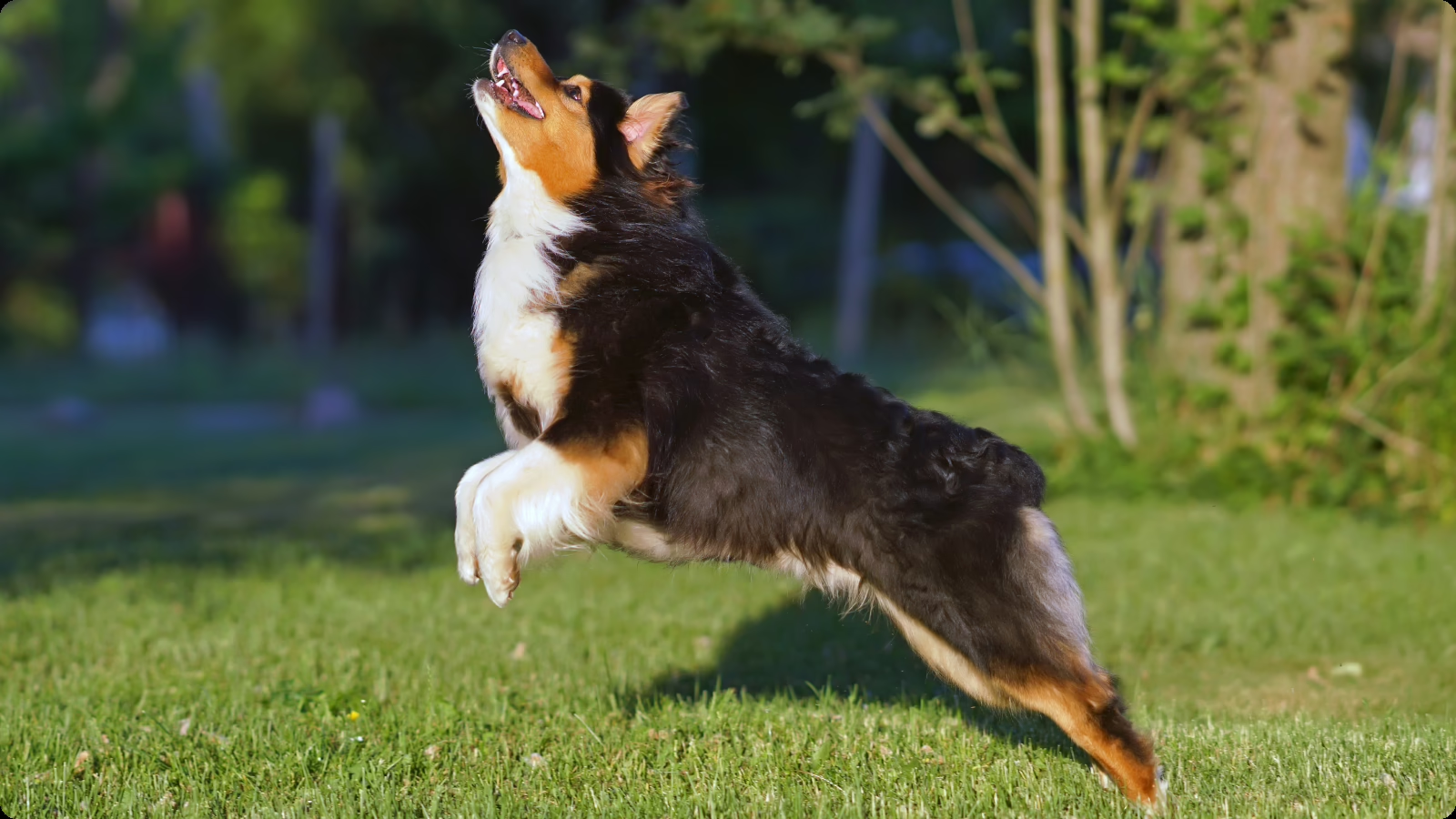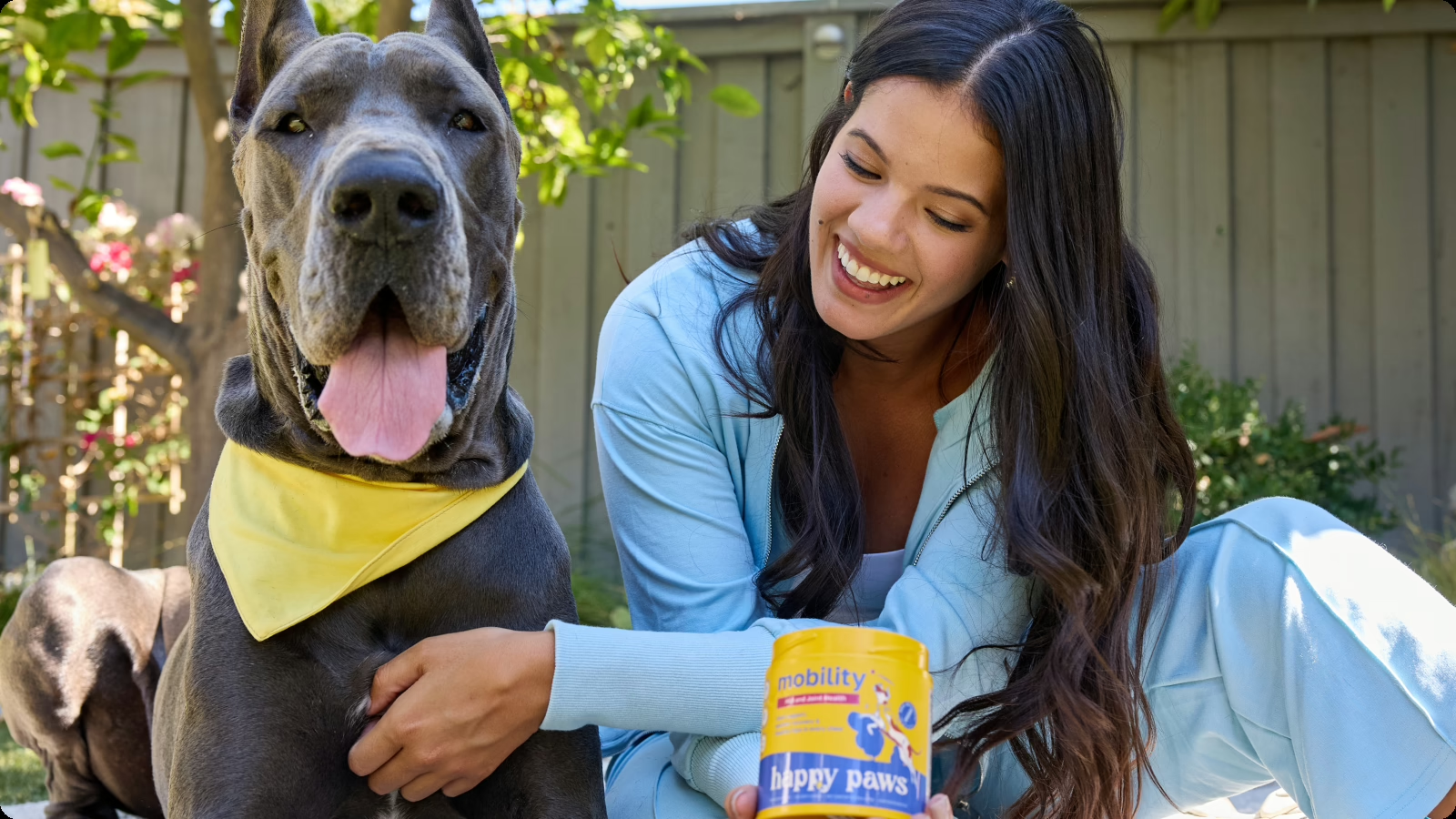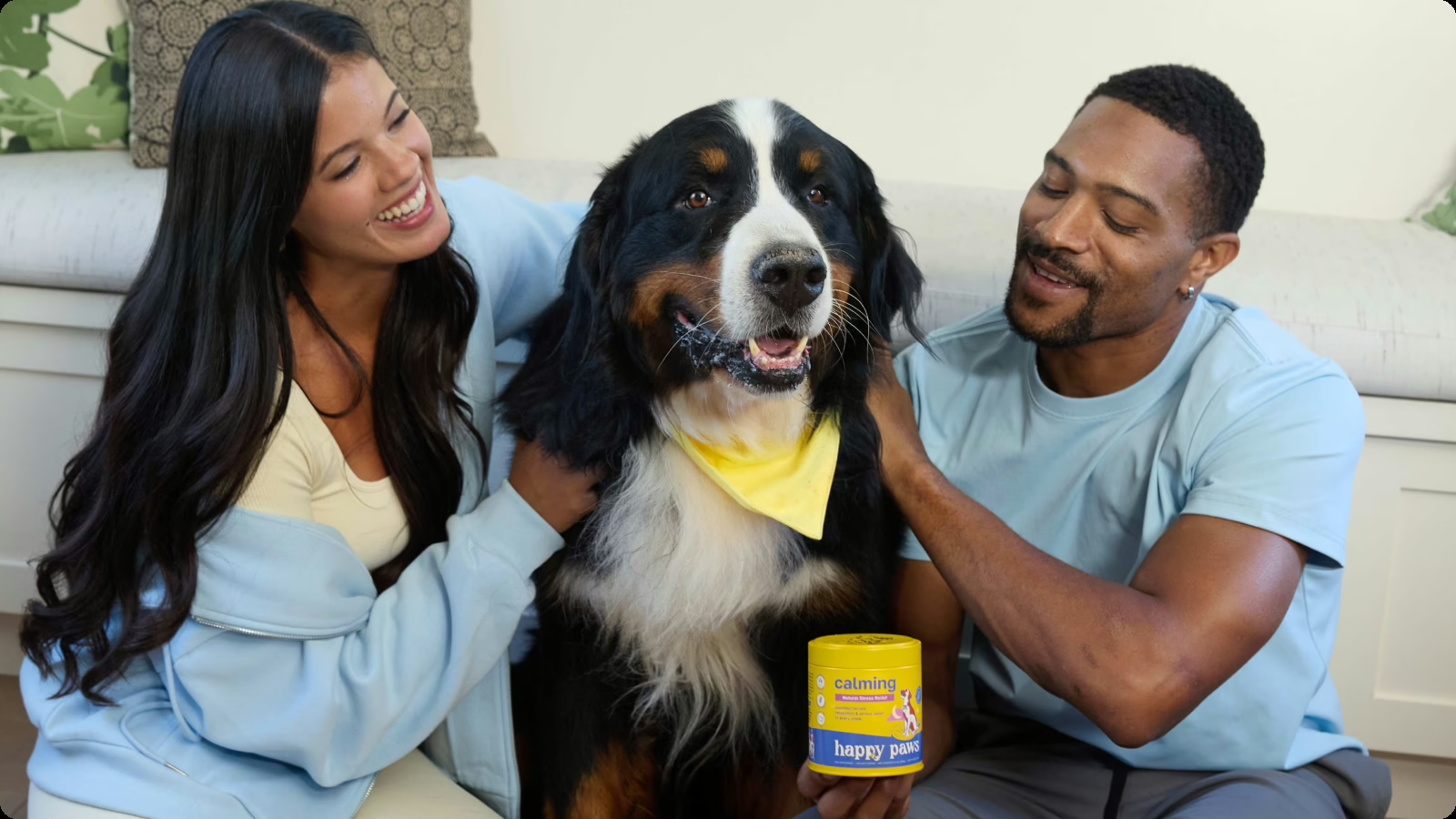The Little Hot Dog
Short, long, and feisty, Dachshunds are beloved for their floppy ears, long snouts, and fierce tenacity. After all, these cute little weiner dogs (an affectionate nickname for Dachshunds) were bred to hunt territorial badgers, and they retain that unflinching confidence today. Whether they’re prancing around a park, striding on leash, or balled up next to you, these dogs carry so much personality in such a small, solid frame. They become beloved members of families before plopping down and sprawling out, letting their ears freely dangle.
At Happy Paws, we’re dedicated to helping all dogs, from purebreds to certified mutts, live their happiest, healthiest lives. We’ve designed our dog supplements to target a range of trouble spots in your dog’s health, many of which include common issues for a Dachshund.
In this article, we’ll explore the history of this long-bodied furball, provide some information and advice on how to care for them, and help you decide which supplements are best for your new pocket-sized hunter, the Dachshund.
Quick Facts
Origin: Germany
Size: Small
Breed Group: Hound
Lifespan: 12–16 years
Coat: Short hair—weekly grooming recommended
Temperament: Friendly, curious, confident & spunky
Exercise Needs: Because of their long, low-rider frame, Dachshunds need light-impact exercise that avoids jumping on or off furniture or stairs. Jumping and awkward landings can strain their spine and joints. So, instead, take your Dachshund on daily walks, strolls, hikes, and saunters through the neighborhood. At home, make sure to keep your Dachshund occupied with toys, treats, and enrichment exercises, like sniff mats.
Training: Taking a Dachshund to behavioral training is like mixing oil with water. These stubborn little pups are confident, steadfast, and a tad rebellious, especially toward those who know them best. But is training a Dachshund impossible? Of course not! These fearless dogs can be trained to behave civilly. But, despite everything, they often retain a pinch of independence.
Dog Health: Like other small dogs, Dachshunds are susceptible to unique health conditions, like joint problems, dental dilemmas, spinal injuries, digestive issues, and more.
Happy Paws for a Dachshund
Enrich your Dachshund’s health with high-quality, tasty supplements like these!
| Type of Happy Paws Supplement | Best for … |
| Calming Dog Chews | Settling your dog’s nerves. |
| Skin & Coat Dog Chews | Strengthening your dog’s coat & dermal health. |
| Dental Dog Chews | Fighting tooth decay & smelly breath. |
| 10-in-1 Multivitamin Dog Chews | Giving your pupper a daily dose of essential vitamins, minerals & other nutrients. |
| Hip & Joint Dog Chews | Soothing common symptoms of joint dysplasia & inflammation. |
| Probiotic Dog Chews | Restoring the healthy bacteria in your dog’s digestive system. |
Popular Supplements for a Dachshund
Our high-quality dog supplements use an array of all-natural, organic ingredients to enrich your dog’s physical and mental health. Here are a few dog supplements to help you care for your Dachshund.
Calming Dog Chews: Made with naturally calming ingredients, like tryptophan and chamomile, these Calming Dog Chews rely on healthy, high-quality elements to help reduce anxiety or stress in dogs. It doesn’t take much to get this breed wired, so a simple, daily calming chew is all they need to relax and tap into their inner couch dog.
Skin & Coat Dog Chews: Our Skin & Coat Dog Chews help support coat shine and skin hydration. These vegan, chicken-flavored soft chews utilize a blend of skin-supporting ingredients, including biotin and coconut oil, to promote dermal health and nourish your dog’s coat.
Dental Dog Chews: Like all dogs, this breed is prone to smelly, unpleasant dog breath. Our Dental Dog Chews combine the refreshing aroma of spearmint with an enzyme blend to neutralize dental bacteria and improve breath freshness.
10-in-1 Multivitamin Dog Chews: Our 10-in-1 Multivitamin Dog Chews use multiple essential nutrients to strengthen your dog’s daily health and give them a well-rounded supplement. One vegan, lamb-flavored dog treat introduces ten critical nutrients to keep your dog healthy, happy, and active.
Hip & Joint Dog Chews: Soothe the symptoms of joint dysplasia with our Hip & Joint Dog Chews! Packed with a blend of joint-friendly ingredients, this dog supplement helps reduce inflammation and support joint health, thanks to compounds like glucosamine, chondroitin, and hyaluronic acid.
Probiotic Dog Chews: Made with powerful antioxidants, probiotics, and superfoods, our Probiotic Dog Chews help strengthen your dog’s digestive system, while supporting their gut and bowel health.
Common Health Concerns for Dachshunds
Compared to other smaller dog breeds, the Dachshund is susceptible to unique health conditions like these:
Patellar Luxation: Patellar luxation occurs when a dog’s kneecap slips out of the joint. Maintaining your dog’s healthy weight can help manage the condition, while joint-friendly supplements can also be beneficial. If you believe your dog has patellar luxation, it’s best to speak with your veterinarian about next steps.
Intervertebral disc disease (IVDD): Found in up to 25% of all Dachshunds, intervertebral disc disease (IVDD) is a unique issue that affects dogs with lengthier spines. IVDD happens when spinal trauma or pressure may displace an intervertebral disc. If left untreated, this problem can lead to paralysis in all four legs. That’s why it’s important to always be mindful of your Dachshund’s back, and invest in stairs or ramps to help them get onto the couch or bed. Common symptoms of IVDD are sudden loss of movement or shivering. If you suspect your dog has had a spinal injury, consult a veterinarian immediately.
Digestive Issues: Digestive problems can develop in any dog at any age. Symptoms can include diarrhea, bloating, gas, low appetite, lethargy, and more. The issue can stem from the dog’s diet, lifestyle, or genetics.
Dental Dilemmas: All dogs are prone to stinky breath. Without proper dental care, Dachshunds can experience plaque buildup and bad breath, which can lead to several issues down the road.
Obesity: Obesity can be common in smaller dogs, mostly because we, as owners, don’t know how to properly measure out meals. When your dog gains weight, they are more likely to experience other health-related problems, like heart problems and diabetes. More weight on your dog’s frame can also impact their hips and joints. So, keep an eye on your dog’s weight.
About Dachshund Dogs

Coined the “weiner dog,” Dachshunds’ cuteness and laughable little frames overshadow their rich, ferocious history. Today, Dachshund owners love the sight and sound of their little fur baby dashing toward them. But if you were a badger in rural 18th-century Germany, that little devil would be the last thing you’d want to see (and probably the last thing you would see).
“Dachs-hund” literally translates to “badger dog” in German. While other dogs were used to root out badgers from German forests and hillsides, no other breed could keep up with the badger’s stamina, agility, and prowess, let alone hold their own once the paws came out. And when that little badger dove into a hole, no dog could get ’em out. Not until the Dachshund came along. Because of this ancestry, today’s Dachshunds surprisingly have a hunter nestled deep in their personalities—one that often mistakes backyard, carefree squirrels for their ancestral German forest foe, the badger.
With their little frames and spirited independence, today’s Dachshunds have earned a cult-like following. They can be seen in coffee shops, on park benches, and prancing around, attracting new friends and welcoming pats. Dachshunds consistently remain one of the most popular dog breeds in the country and have earned an irreplaceable place in families of all sizes.
The Dachshund Personality
As humorist E.B. White famously said about his Dachshund, Fred, “I would rather train a striped zebra to balance an Indian club than induce a Dachshund to heed my slightest command.” E.B. went on to say, “He even disobeys me when I instruct him in something he wants to do.” And well, that reputation stands. Even when bred with other types of dogs, the Dachshund’s “independent stubbornness” becomes apparent. These dogs are confident, opinionated, and direct. They are also cute, lovable, and spunky. They get along with well-trained dogs and can be great for first-time pet parents. So, while their reputation precedes them, their unflappable cuteness helps ’em get away with so much.
The Daschshund Training Guide
While they may be oh-so adorable, Dachshunds do require special training to win them over, keep them in line, and wrangle in that badger-hunting instinct.
Behavior Training
If 18th-century farmers could teach a Dachshund to root out badgers swiftly and quietly, you can teach your Dachshund how to “sit,” “stay,” and “put that down right now!” It’s just going to take a lot of patience. These dogs are smart, and they yearn for your approval; they just won’t show it. Focus on basic behavior training to teach your Doxie how to behave around guests, kids, and the elderly. This will also help your Dachshund learn how to manage their emotions—a feat not all Dachshund owners can claim.
Early & Often Socialization
Socialization is when you introduce your dog to other well-behaved dogs and people at a young age, as early as seven to eight weeks. This helps your Doxie meet new faces and get comfortable around strangers. Make socialization a weekly habit to keep your dog calm, cool, and relaxed around new friends.
Plenty of Exercise
While Dachshunds don’t need as much exercise as other breeds, they do need daily walks to keep their weight down and mental challenges to keep their brain healthy. Take your Doxie on long walks, hikes, and strolls to get in their daily step count. Then, play with them. These ferocious fellas love tug-of-war and fetch. But expect to lose. These dogs are persistent and love to win. The Dachshund won’t give up until they’ve conquered your will.
Happy Paws: High-Quality Dog Supplements
Keeping your dog happy, healthy, and active shouldn’t feel like a full-time job. At Happy Paws, we’ve designed our dog treats with the best ingredients and flavors possible (our dogs definitely approve!). We’ve made sure these treats are certified organic, non-GMO, and third-party tested for purity, letting you spoil your dog easily with healthy, tasty dog treats.
FAQ
Is a Dachshund a good family dog?
Dachshunds can be a good family dog for the right family and with the proper training. These dogs often like to lounge and don’t require hours of exercise. They are good for first-time pet parents.
Are Dachshunds high maintenance?
The main problems associated with owning a Dachshund are caring for their spines and joint health, and managing their cute little Napoleon complex. If you can do both, then this breed just might be your next best friend.
Do Dachshunds bark a lot?
Dachshunds can bark a lot, but they can also be trained not to.
Can a Dachshund stay home alone?
Despite their stubborn nature, Dachshunds are social creatures. They may experience separation anxiety when left alone. You can use certain training tricks to help quell separation anxiety, plus all-natural calming dog treats can help settle their nerves.
How do you give your dog health supplements?
You can give your dog a Happy Paws health supplement in several ways. First, we’ve designed these supplements as dog treats, so you can give them to your pupper as a reward for good behavior. Or, you can add it to your dog’s kibble; they make a pretty tasty topper, too.





